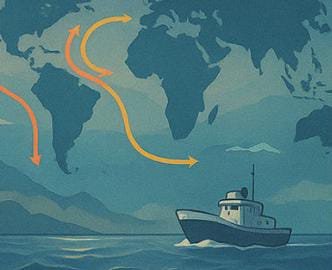
“To read the ocean is to read the poetry of the Earth — every wave holds meaning.”
Oceanography is the scientific study of the ocean in all its dimensions — its physical movements, chemical composition, biological life, and geological structure. More than just an academic field, oceanography is a multidisciplinary bridge that connects the mysteries of the deep with our understanding of the planet’s systems.
Understanding Oceanography
At its core, oceanography is the exploration and analysis of the world’s oceans. It integrates physics, chemistry, biology, and geology to answer fundamental questions:
How do ocean currents circulate, and what drives them?
What role does the ocean play in regulating Earth’s climate?
How does life adapt to the extreme conditions of the deep sea?
This field is critical for predicting weather patterns, managing marine resources, and understanding the impact of human activity on ocean ecosystems.
Four Pillars of Oceanography
Physical Oceanography – Studies waves, tides, currents, and the ocean’s interaction with the atmosphere.
Chemical Oceanography – Examines the chemical composition of seawater, including nutrient cycles and pollutants.
Biological Oceanography – Focuses on the organisms living in the ocean and their ecological relationships.
Geological Oceanography – Explores the ocean floor’s features, including trenches, ridges, and sediment layers.
Tools and Technology
Modern oceanographers use a range of sophisticated tools, from research vessels and deep-sea submersibles to satellite imaging and autonomous underwater drones. These technologies allow scientists to map the seafloor, monitor marine life, and study processes that were once beyond reach.
Why Oceanography Matters
The ocean is the largest carbon sink on Earth, a vital food source for billions, and a key driver of the global climate. By studying it, we gain insights that help protect biodiversity, ensure sustainable fisheries, and prepare for environmental challenges such as sea level rise and ocean acidification.
A Closing Thought
The ocean is both ancient and ever-changing — a vast archive of Earth’s history and a dynamic engine shaping its future. In reading the ocean, we not only expand our scientific knowledge but also deepen our connection to the planet.
